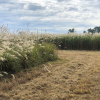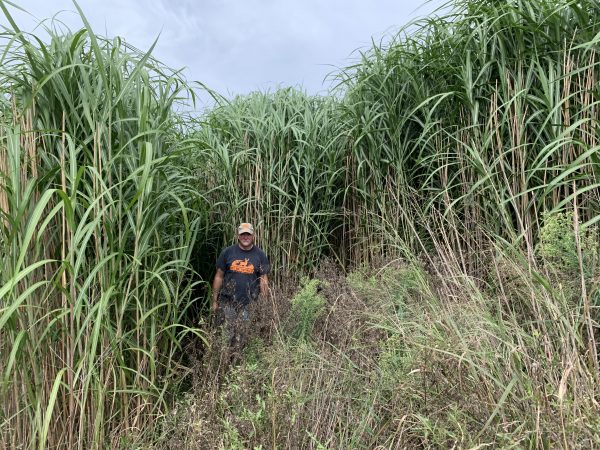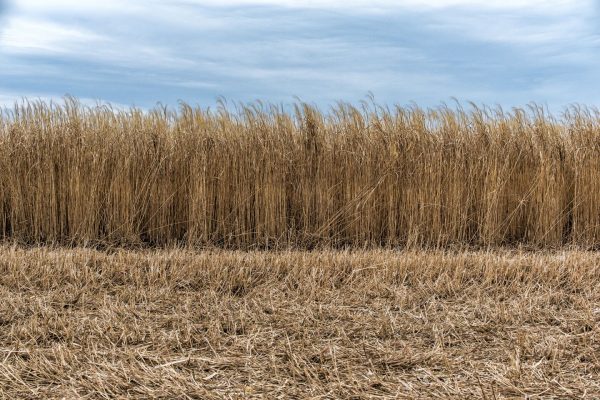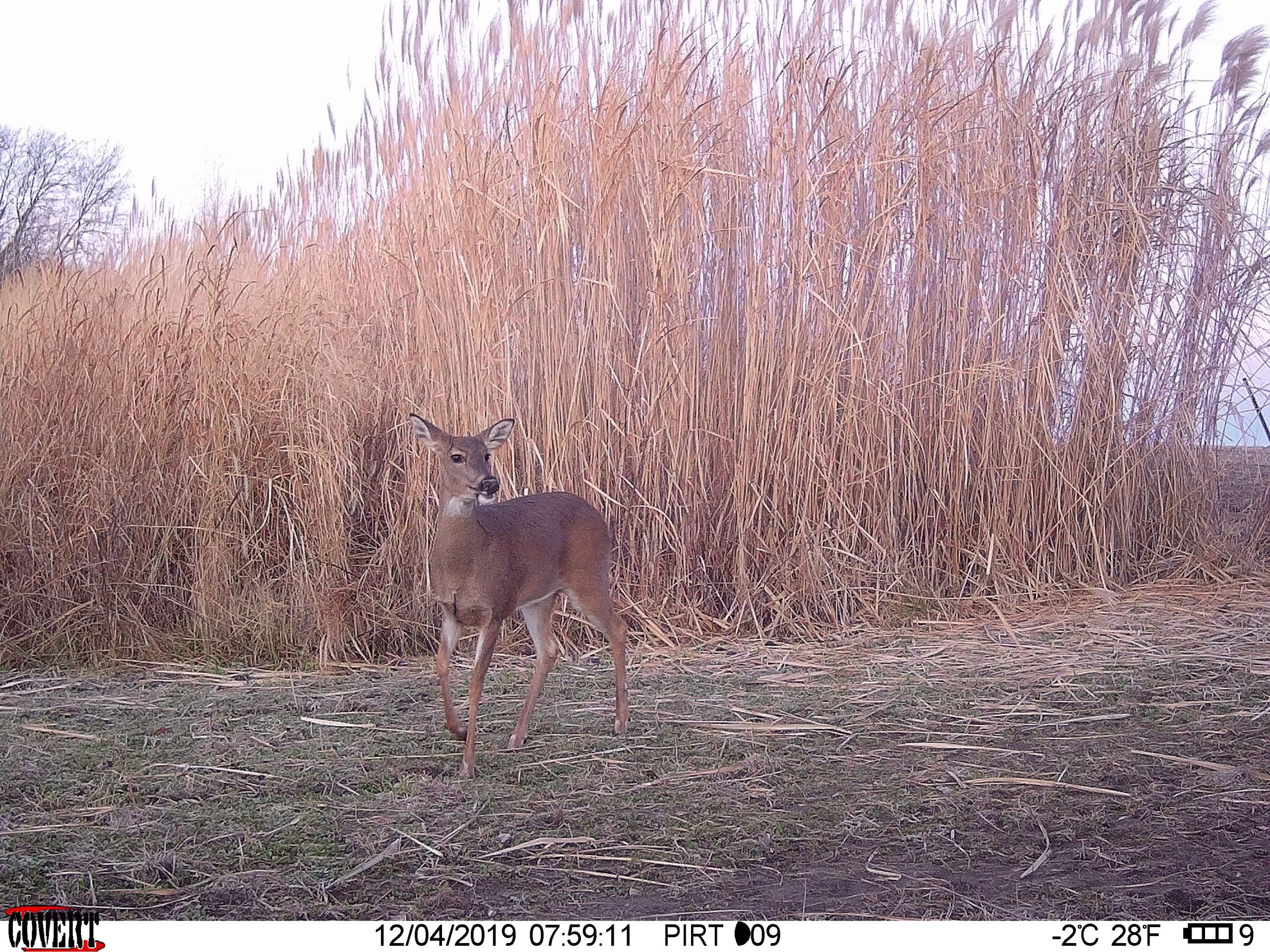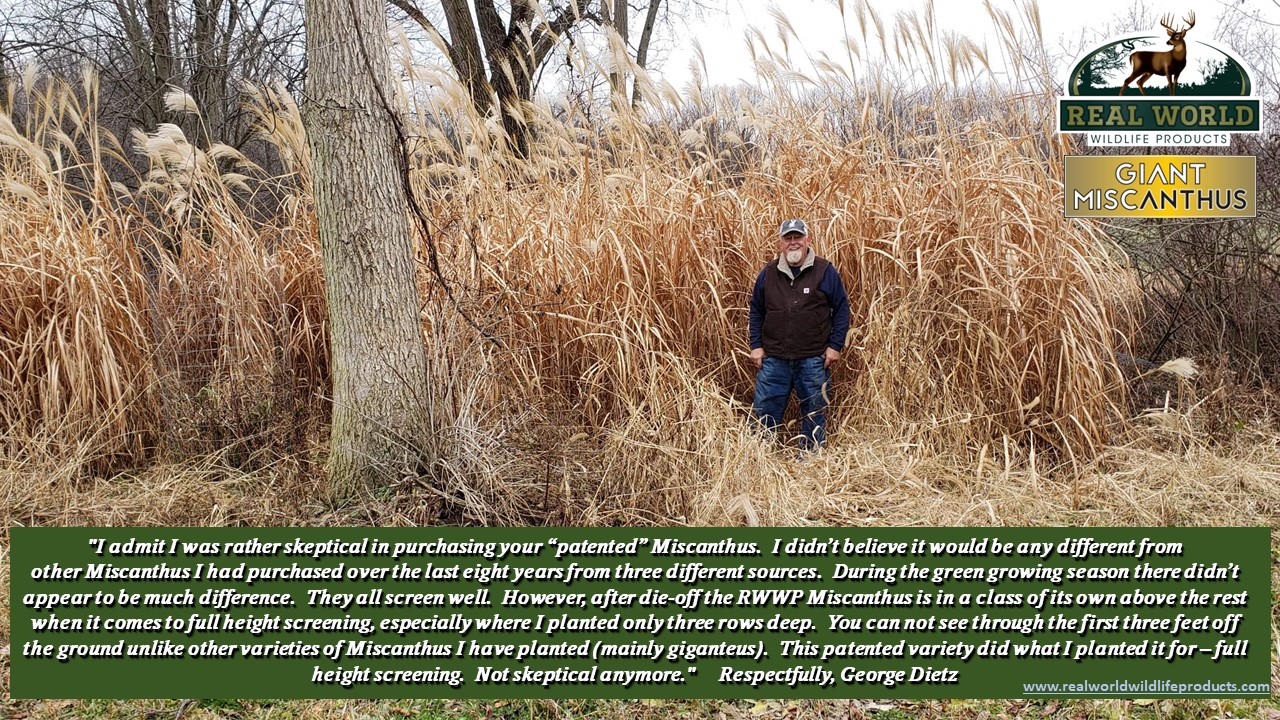Description
We’ve always recommended planting three-row hedges of miscanthus. The quickest way to figure out how many rhizomes you’ll need is to use this equation:
Length of planned hedge IN FEET X 2 = Rhizomes needed.
There is usually a 3-5 percent overcount in each bag.
QUICK ANSWERS TO COMMON QUESTIONS:
1.) How will it do in wet areas that flood? Answer – Not good – this product does not like wet feet. Consider Real World Switchgrass
2.) How much sunlight do I need? Answer – Think of Real Worlds Giant Miscanthus as you would corn. Giant Miscanthus and corn require the very same growing conditions. Both needs full sunlight, adequate rainfall, and freedom of competition from trees, weeds, etc.
3.) Can I dig up and replant rhizomes and transplant to other areas? Answer -NO! The Giant Miscanthus that Real World sells is a patented cultivar and protected by patent laws. Real World works closely with and under the supervision of the patent holder who requires us to report any sales over a certain volume. This is no different than the patented technology in the agricultural seed industry where harvested grain seed cannot be replanted.
4.) How many Real World Giant Miscanthus Rhizomes do I need? Answer –
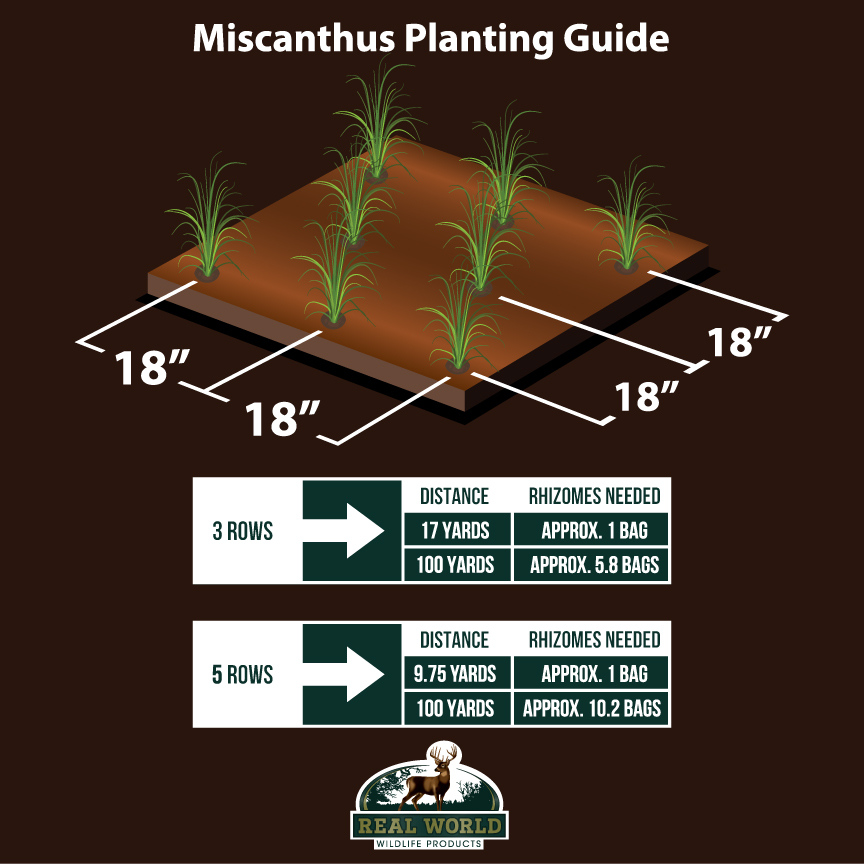
ABOUT REAL WORLD GIANT MISCANTHUS:
For years our customers have been asking us if Real World was ever going to come out with a plot screen product. We tested a lot of different annual plant species, but they all fell short (pun intended) of earning the Real World label. While some looked great while growing and early in the fall, they would all fall over once the plants died. We refused to sell a product that we knew would ultimately not do what was expected of it.
Real World Wildlife Products president Don Higgins first planted miscanthus grass on his farm several years ago and was so impressed with what he saw and the potential that this plant offers the wildlife land manager that he put in considerable time and effort learning more about this extremely tall grass. When he discovered that there are different varieties of miscanthus he arranged for the Real World team to visit different university, corporate and private test plots around the country. After looking at numerous miscanthus cultivars the Real World team focused on one specific variety that they felt would be the very best for screening and other habitat applications. They then negotiated with the patent holder of this specific variety and ultimately signed a contract to market it. MAKE NO MISTAKE, REAL WORLD GIANT MISCANTHUS IS DIFFERENT THAN OTHER MISCANTHUS! It gets as tall as any other miscanthus but has more leaf for better screening. Dare to Compare!
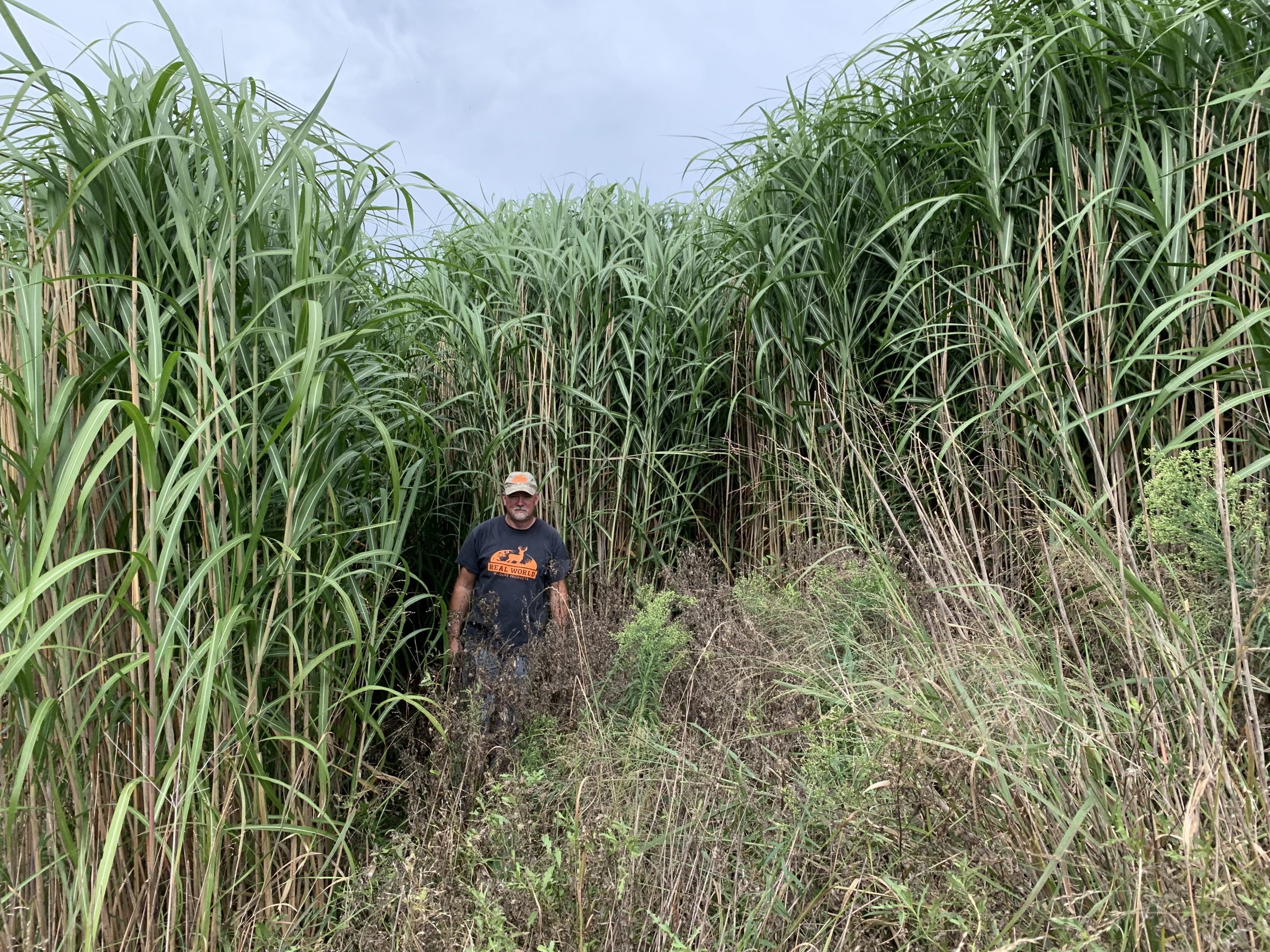
What is miscanthus?
Miscanthus is a woody perennial grass native to Asia that typically grows to heights of 12’ plus. It produces bamboo-like stalks which average 3/8” in diameter. It is a non-invasive grass that does NOT produce viable seeds. Because of the huge yields it produces per acre, miscanthus is used primarily for bio-fuel production. Miscanthus is a cold hardy grass that grows rapidly, has low nutrient requirements and has few pests or diseases.
How is miscanthus propagated (grown)?
Miscanthus is established by planting pieces of root called “rhizomes”. Since it is sterile and it must be propagated by rhizome division rather than by seed. The rhizomes are planted about 4″ deep and spaced 18” apart and in rows that are spaced 18”-24” apart. Each plant will spread 4”-6” per year and fill in the rows to create a dense hedge. For a good screen plant 3-5 rows.
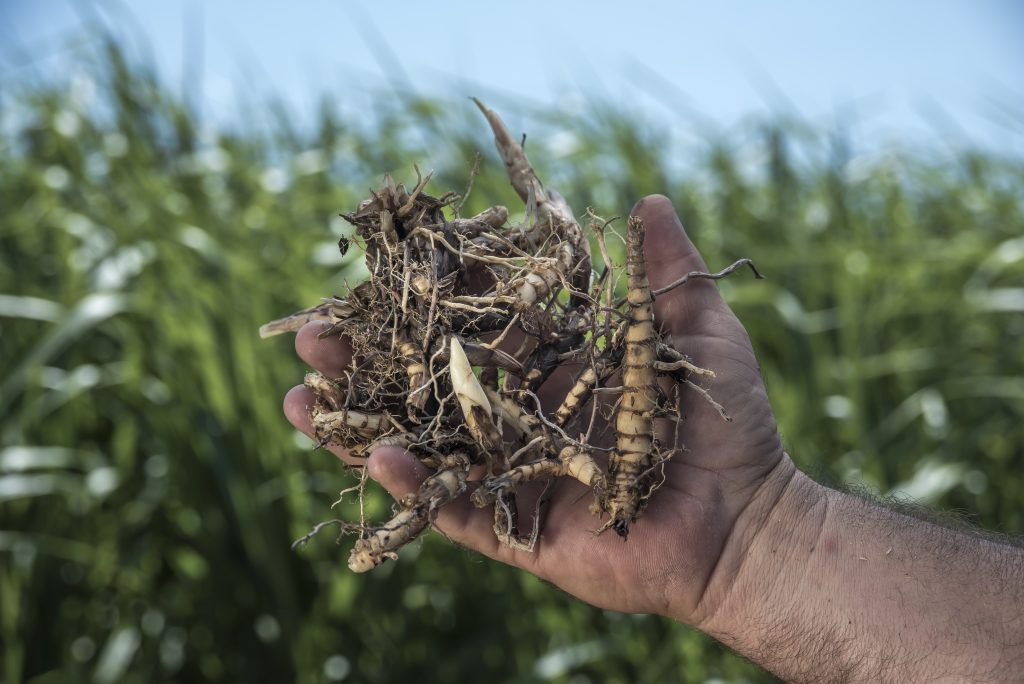
Can I grow Real World Giant Miscanthus in my area?
The specific cultivar of miscanthus known as Real World Giant Miscanthus has been grown successfully from the Gulf of Mexico into southern Canada. It is tolerant of both the tropical heat in southern states as well as the colder northern regions of the United States.

TO LEARN MORE ABOUT STORING YOUR MISCANTHUS UPON ARRIVAL GUIDE – CLICK HERE
How do I go about establishing Real World Giant Miscanthus on my property?
Miscanthus rhizomes should be planted in the spring once the soil can be worked. A well-tilled bed does help the roots establish more quickly but is not necessary. The rhizomes should be planted 4” deep and spaced 18” apart in rows that are spaced 18”-24” apart. Remember, every year these plants will expand approximately 4″ in each direction. Good results can be achieved on a wide range of soils but the key is moisture. Adequate moisture and 60° ground temperature will promote good growth. Miscanthus can tolerate a wide range of soil pH but performance is best between 5.5 and 7.5 pH. Sandy soils only yield well if rainfall is adequate due to its dry nature. Weed control is important during establishment. Do not worry as much about grass competition, but more so with broadleaf weeds during the first year of establishment. Most common corn herbicides will be fine to use on miscanthus – Dual, Atrazine, 2,4-D etc. It is a good idea to spray an herbicide like atrazine right after planting your rhizomes in a weed-free seed bed.
How should I store my miscanthus rhizomes?
We strongly encourage you to have your planting site ready and plant your rhizomes as soon as possible after receiving them. Rhizomes can be stored for 2-4 weeks in a refrigerated storage unit. The colder temperatures keep the rhizomes dormant and slows the growth. Do not put rhizomes in the freezer.
What kind of growth should I expect from my Real World Giant Miscanthus?
The first year each individual rhizome should produce 1-3 stalks that will be anywhere from 1’-8’ tall depending on location, soil and weather conditions. The second year you should see 5-7 stalks from each plant that will be anywhere from 4’-12’ tall. By year three, each cluster should be approximately 14″ diameter with about 20-25 stalks and 10’-12’ tall. After this the individual clusters will start growing into each other and filling in any gaps. These figures are an “average” and you may see better or worse results based on your location, weather and soil type. By year three you should have great screening cover although it can be very adequate before that.
How do I maintain my miscanthus and should I fertilize?
Fertilizer demands are low but a modest fertilizer application about a month after planting will promote growth in both rhizomes and stalks. For fertilizer simply use a generic triple-12 or triple-15 fertilizer. After the first year, only small quantities of nutrients will be needed every two to four years to help maintain good yields. Apply follow-up applications of fertilizer in late winter or early spring. If possible, burn your miscanthus every 2-3 years in the early spring. This will get rid of the old thatch and help control and weeds or tree saplings that may be starting. It will also stimulate the growth of your miscanthus and keep your stand going strong. Mowing is another option but not nearly as good as burning.
How can I create the best screen possible on my hunting property?
For years Real World customers have been using Real World switchgrass to create screening cover. Now with Real World Giant Miscanthus you can combine the two tall grasses to create the ultimate screen. Start the fall before you intend to plant by creating a 12’-15’ wide seed bed where you want your screen. In late winter, frost seed Real World switchgrass into your seed-bed at a rate of no more than 4# per acre. As early as possible in the spring, plant 3 rows of Real World Giant Miscanthus in this same seed-bed. Plant the first row of miscanthus right down the middle of the seed bed and then a row 2’-3’ on each side of the middle row. Control weeds the first year by using an application of atrazine at a rate of 1-quart per acre as early as possible in the spring. If broadleaf weeds become an issue later in the summer, spray with 2-4D. Once established you will have the very best screen possible outside of a solid wall.


